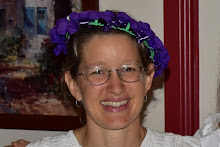Another week of school is over, and we’re settling into a
routine. Of course, after just another week, P13 and E11 will be flying to the
mainland to spend a month with their grandparents, and the rest of us will join
them in early September, so our routines will take a hit – but at least we’ll
have a general idea of the pattern we need to return to.
We added in science and current events this week, and
everyone enjoyed them. One thing that always helps is that I am excited about
both, and I like to think my enthusiasm rubs off on my children.
P13 and E11 are studying Earth Science this year using a
textbook from Novare. This is the best science program I’ve used, and we’ve
tried many. I described some of my reasons for choosing Novare in my “update on
our experiment” post. Having used it for a full week now, I can add a few more
loves. Firstly, to use E11’s words, it “doesn’t underestimate [his] powers”.
The science is in no way dumbed down; the chief difference between this book
and my college geology textbooks is that it explains fewer, more basic topics
with greater clarity – but with the same level of respect for the reader’s
intelligence. The spiritual content isn’t overbearing, but is introduced
conversationally, in much the same style as the asides I would always insert
when we were using secular programs, and with a genuine sense of wonder at the
glory and beauty of God’s creation. The end-of-section questions don’t require
mere regurgitation of the facts, instead calling for reasoning based on a deep
understanding of the concepts. (For example, after the section on lunar phases,
the children needed to determine what phases an observer on the moon would see
on Earth during each lunar phase). On Friday, we covered the section on
eclipses, a timely lesson given that we plan to wake up early on Monday morning
and take a home-built viewer somewhere with an eastern horizon to try to see
the sun rising partially eclipsed.
As I had hoped, the fascinating content is inspiring both
P13 and E11 to write excellent responses to the end-of-section questions.
Frequently, when a single sentence would suffice, E11 (my reluctant writer) is
writing entire paragraphs in explanation. His spelling and mechanics are
atrocious, and I have struggled with how to correct him without
discouraging him. After watching some more teacher training from the Institute
for Excellence in Writing, I am resolving to choose one writing concept to
focus on at a time (capitalizing each sentence, spelling new vocabulary
correctly, creating a “frequently misspelled words” list and proofreading based
on that) and not badger him about things we haven’t yet focused on. He doesn’t
always handle correction well, but I know if I expect more of him, he will be
able to produce it. The only end-of-section question that really upset E11 this
week was the one asking him to calculate Earth’s orbital speed, given the
orbital radius. The tantrum he threw! “There shouldn’t be any MATH in SCIENCE!”
I laughed and laughed. I’m laughing again now. Oh, child, the sooner you lose
that misconception, the happier you’ll be! Fear not, gentle reader, he
calculated the orbital speed (after an hour of moaning).
Because I already had it lying around, I’m using Sonlight
Science B for B7’s science. Because it covers animals, magnetism, and light,
areas he hasn’t yet become obsessed with, a presentation aimed at children his
age isn’t hopelessly too easy for him. It also doesn’t take me more than 15
minutes a day (except on days we do experiments), which means it gets done! H5
occasionally listens in, so I consider it to fulfill his science requirement,
as well. I’d like to add in some more advanced chemistry content for B7, which
didn’t happen this week but hopefully will in future weeks.
This is the first year we are including a discussion of
current events as a formal part of our studies. I considered a variety of news
sources, and finally settled on CNN 10. It is a 10-minute show, available
online, covering selected world and US events 5 days a week. Because it is
aimed at students, it does a good job of providing necessary historical and
geographical background without assuming the level of awareness of an informed
adult. For my own edification and in order to add more background and
commentary, I have been listening to World Radio, which gives a Christian
perspective on world and US events, with frequent in-depth analysis from
various commentators. After the children have watched the daily CNN 10 show,
either P13 or E11 describes one of the news items to the whole family at
dinnertime, which often launches an animated discussion with further analysis.
For example, E11 discussed the cholera epidemic in Yemen resulting from the
current civil war, which launched a discussion of water-borne disease.
Next week I plan on adding in writing. I’ll have P13 go
through Student Intensive B from the Institute for Excellence in Writing, and
give her assignments based on what she’s reading in other subjects. All 4 of my
school-aged children will be writing letters and journal entries weekly, and
I’ll have H5 and B7 work on handwriting daily while E11 and P13 do weekly blog
entries. I’m also going to resume H5’s reading lessons. Right now, he is able
to sound out CVC words and has read the first dozen or so of Sonlight’s
kindergarten readers. I’ve been using the appropriately titled The Reading Lesson, which claims to get
a child to a 2nd grade reading level by the end of the book. I’ve
used it with all the older children, and we’ve never finished it: the child
always takes off and begins reading fluently before we reach the end, so I have
high hopes for H5 as well.


No comments:
Post a Comment